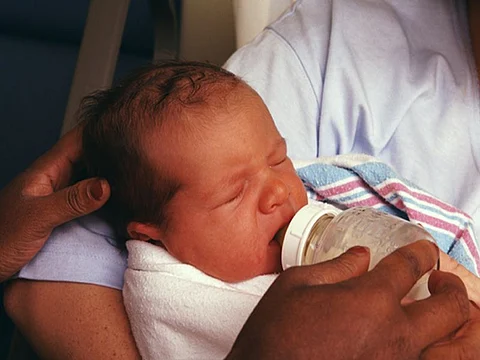MONDAY, Dec. 19, 2016 (HealthDay News) -- Tiny preemies can benefit from donated breast milk -- if it's given in the hospital with proper safety measures, a leading pediatricians' group says.
However, the American Academy of Pediatrics (AAP) also warned parents against informal "milk-sharing," or buying breast milk online.
It's the first time the academy has issued a policy statement on donor breast milk, which is being used by a growing number of U.S. hospitals -- mainly in neonatal intensive care units (NICUs).
Specialists welcomed the report, saying it highlights an important measure for improving tiny preemies' health.
It could serve as a "wake-up call" to hospitals that are not yet using donor breast milk, said Diane Spatz, director of the breast-feeding and lactation program at Children's Hospital of Philadelphia.
Recent research has found that more NICUs are starting to offer donor milk. But there's a long way to go, according to Spatz, who was not involved in the policy statement.
"In 2016, we still have less than 40 percent of NICUs using donor milk," she said.
How exactly is donor breast milk used?
When babies are born very prematurely, or need intensive care for medical issues at birth, their mothers may be unable to breast-feed them. Ideally, moms can pump their milk, and give it to their babies by bottle.
But in reality, many of those mothers cannot express enough milk right away, explained Dr. Andrea Trembath, a neonatologist at University Hospitals Rainbow Babies & Children's Hospital in Cleveland.
That's where donor breast milk comes in -- as a temporary solution until mothers can use their own milk.
"It's not a replacement for the mother's breast milk. It's a 'bridge' that helps mothers supply an exclusive human milk diet," Spatz explained.
There are clear benefits to giving donor milk instead of formula, Trembath said. For one, it can cut babies' risk of a potentially fatal gut infection called necrotizing enterocolitis.
Breast milk also aids in such critical things as brain and lung development, Spatz said.
Hospitals get donor milk from various human milk "banks." Right now, there are 20 nonprofit banks across the United States that are part of the Human Milk Banking Association of North America. Others are in development.
Children's Hospital of Philadelphia runs its own milk bank that is accredited by the milk banking association. The process of becoming a milk donor, and ensuring the safety of the breast milk, is a rigorous one, Spatz said.
Before women can become donors, she explained, they go through a screening process that includes blood tests for infections like hepatitis and HIV.
All donated milk is then pasteurized, and banks routinely culture the pasteurized milk to look for bacterial contamination.
Those safety measures are critical, according to Dr. Steven Abrams, the lead author of the AAP policy statement.
When infants receive pasteurized milk from an established bank, any risks would be "extraordinarily low," said Abrams, a professor of pediatrics at the University of Texas at Austin.
"What worries us is that some parents are using informal milk-sharing, or buying donor milk over the internet," Abrams said.
Unpasteurized donor milk could expose babies to viruses or bacteria, according to the AAP. There could also be other contaminants -- including medications or illicit drugs the donor used.
Plus, when money enters the picture, Trembath noted, other issues come up. One recent study found that breast milk bought online had been diluted with cow's milk.
"Please don't buy [breast milk] over the internet," Trembath said. "Do it the safe way, through an established program."
There are some obstacles to wider use of donor milk in hospitals, according to the AAP. One is the limited number of milk banks that are currently available.
Another is cost of providing milk to hospitals and families. Hospitals generally supply donor milk free of charge and bear the costs themselves, Abrams said. Reimbursement is "inconsistent" between states and sources of payment, he noted, and that might deter some hospitals from starting a donor milk program.
But to Spatz, the biggest obstacle is the lack of a "strong breast-feeding culture" in many hospitals.
Donor milk is not a stand-alone measure, she explained. It has to be part of a bigger effort to help new mothers breast-feed.
According to Spatz, that includes having new moms start pumping their milk soon after delivery, and letting them have skin-to-skin contact with their newborn as soon as the baby is stable and healthy enough.
The policy statement was published online Dec. 19 in the AAP journal Pediatrics.
More information
The U.S. Centers for Disease Control and Prevention has more on breast-feeding.



